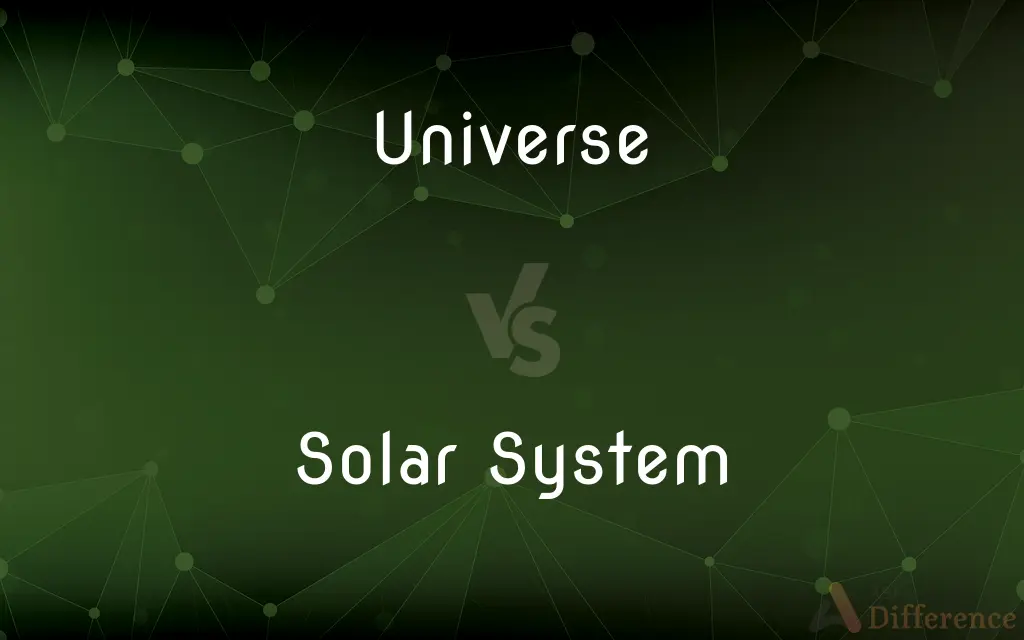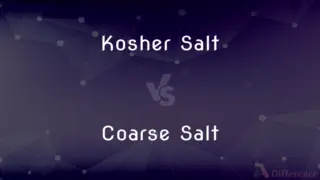Universe vs. Solar System — What's the Difference?
Edited by Tayyaba Rehman — By Fiza Rafique — Published on December 4, 2023
The Universe encompasses all of space, time, matter, and energy, while the Solar System refers to the Sun and its orbiting celestial bodies.

Difference Between Universe and Solar System
Table of Contents
ADVERTISEMENT
Key Differences
The Universe is vast, encompassing everything that exists from the tiniest particles to galaxies beyond our comprehension. In contrast, the Solar System is a specific collection of bodies, consisting of the Sun and the objects gravitating around it, like planets and asteroids.
When you think of the Universe, imagine an endless expanse that contains billions of galaxies, each with billions of stars and planets. The Solar System, on the other hand, is just one of those systems within the Milky Way galaxy, distinguished primarily by our central star, the Sun.
Understanding the Universe's scale means realizing that it holds mysteries like black holes, dark matter, and other galaxies. The Solar System, while vast in its own right, is confined to the objects around the Sun, including eight planets, moons, and smaller objects like comets.
The origin and future of the Universe are subjects of intense study, encompassing theories like the Big Bang and cosmic inflation. Meanwhile, the Solar System's exploration focuses on understanding planetary formation, the potential for life, and celestial mechanics.
The Universe's expanse is still a subject of research, with scientists unsure of its full size or if it's infinite. The Solar System, however, has boundaries defined by the outermost objects influenced by the Sun's gravitational pull.
ADVERTISEMENT
Comparison Chart
Definition
All of space, time, matter, and energy.
The Sun and its orbiting celestial bodies.
Scale
Contains billions of galaxies.
One system within the Milky Way galaxy.
Components
Galaxies, stars, black holes, dark matter.
Sun, planets, moons, asteroids, comets.
Study Focus
Origin, expansion, and fate of everything.
Planetary formation, celestial mechanics, potential for life.
Boundaries
Uncertain; possibly infinite.
Defined by outermost objects influenced by the Sun's gravity.
Compare with Definitions
Universe
All existing matter and space as a whole.
We are just a tiny speck in the vast expanse of the Universe.
Solar System
The Sun's gravitational domain, including planets and comets.
The Kuiper Belt lies at the outer edge of the Solar System.
Universe
The entirety of space, time, and all its contents.
The mysteries of the Universe have always intrigued scientists.
Solar System
A system of planets and other bodies orbiting a star.
The Solar System's exploration provides insights into planetary evolution.
Universe
A boundless expanse of galaxies, stars, and cosmic phenomena.
The Universe's sheer size is difficult to comprehend fully.
Solar System
Our localized region within the Milky Way galaxy.
Studying the Solar System can inform us about potential extraterrestrial life.
Universe
Everything that exists, observed or not.
Some believe there might be multiple universes beyond our own.
Solar System
The collection of eight planets around the Sun.
Mars, known as the red planet, is part of our Solar System.
Universe
All spacetime, matter, and energy, including the solar system, all stars and galaxies, and the contents of intergalactic space, regarded as a whole.
Solar System
The Sun and the celestial objects bound by its gravity.
Earth is the third planet in our Solar System.
Universe
A hypothetical whole of spacetime, matter, and energy that is purported to exist simultaneously with but to be different from this universe
An alternate universe.
Universe
A model or conception of the earth and everything else that exists
“Apart from celestial beings, the aboriginals' universe contained spirits of the land and sea” (Madhusree Mukerjee).
Universe
The human race or a subset of it
“It was a universe that took slavery for granted” (Adam Hochschild).
Universe
A sphere of interest, activity, or understanding
“their almost hermetically sealed-off universe of part-time jobs and study and improvised meals” (Sue Miller).
Universe
(Logic) See universe of discourse.
Universe
(Statistics) See population.
Universe
Alternative case form of Universe; Our universe.
Universe
The sum of everything that exists in the cosmos.
I think that the universe was created by a life force rather than a deity.
Universe
An entity similar to our universe; one component of a larger entity known as the multiverse.
Universe
Everything under consideration.
In all this universe of possibilities, there is only one feasible option.
Universe
A sample taken from the population.
Universe
An imaginary collection of worlds.
The universe in this comic book series is richly imagined.
Universe
A collection of stories with characters and settings that are less interrelated than those of sequels or prequels.
Universe
A whole world, in the sense of perspective or social setting.
That didn’t just rock my world, it rocked my universe.
Universe
(pantheism) A deity who is equivalent to the sum of everything that exists in the cosmos.
The universe wants you to succeed.
Universe
(archaic) The Earth, the sphere of the world.
Universe
All created things viewed as constituting one system or whole; the whole body of things, or of phenomena; the to~ pa^n of the Greeks, the mundus of the Latins; the world; creation.
How may IAdore thee, Author of this universeAnd all this good to man!
Universe
Everything that exists anywhere;
They study the evolution of the universe
The biggest tree in existence
Universe
(statistics) the entire aggregation of items from which samples can be drawn;
It is an estimate of the mean of the population
Universe
Everything stated or assumed in a given discussion
Universe
The cosmic system encompassing all known phenomena.
The Universe has been expanding since the moment of the Big Bang.
Common Curiosities
Is the Milky Way the only galaxy in the Universe?
No, the Milky Way is just one of billions of galaxies in the Universe.
How did the Solar System form?
The Solar System formed from a collapsing cloud of gas and dust, with the Sun forming at the center and planets forming from the remaining material.
What is the Universe?
The Universe encompasses all of space, time, matter, and energy.
How old is the Universe?
The Universe is approximately 13.8 billion years old.
Does the Universe have an edge?
The observable Universe has limits based on the age of the Universe and the speed of light, but whether the entire Universe has an edge is still a topic of debate.
How many planets are there in our Solar System?
There are eight recognized planets in our Solar System.
What makes up the Solar System?
The Solar System consists of the Sun and celestial bodies orbiting it, including planets, moons, and asteroids.
How many solar systems are in the Universe?
The Universe contains billions of galaxies, each with potentially billions of solar systems.
Are there other solar systems like ours in the Universe?
Yes, many exoplanets and their solar systems have been discovered, some with similarities to our own.
What's at the center of the Universe?
The Universe doesn't have a center in the traditional sense; it's expanding uniformly in all directions.
Share Your Discovery

Previous Comparison
ISO 14001 vs. ISO 45001
Next Comparison
Kosher Salt vs. Coarse SaltAuthor Spotlight
Written by
Fiza RafiqueFiza Rafique is a skilled content writer at AskDifference.com, where she meticulously refines and enhances written pieces. Drawing from her vast editorial expertise, Fiza ensures clarity, accuracy, and precision in every article. Passionate about language, she continually seeks to elevate the quality of content for readers worldwide.
Edited by
Tayyaba RehmanTayyaba Rehman is a distinguished writer, currently serving as a primary contributor to askdifference.com. As a researcher in semantics and etymology, Tayyaba's passion for the complexity of languages and their distinctions has found a perfect home on the platform. Tayyaba delves into the intricacies of language, distinguishing between commonly confused words and phrases, thereby providing clarity for readers worldwide.
















































